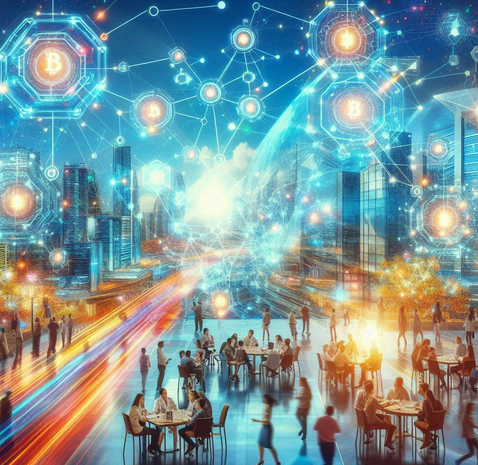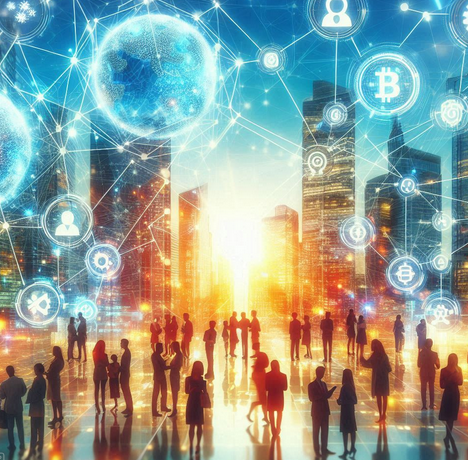
Artificial Intelligence, once confined to science fiction, now governs many facets of modern life — from personalized recommendations on streaming platforms to real-time fraud detection in banking systems. Yet, despite its rapid integration into our daily experience, the Future of AI remains a vast, complex, and partially uncharted domain. As we gaze toward the next decade, a constellation of advancements, ethical dilemmas, societal transformations, and economic recalibrations emerges.
The Paradigm Shift: From Automation to Autonomy
The initial wave of AI primarily revolved around automation—machines designed to perform repetitive tasks with high accuracy. However, the next frontier will revolve around autonomy. Systems will not just execute tasks, but understand, decide, and evolve. Autonomous vehicles, intelligent robotics, and decision-making algorithms in fields such as healthcare and finance will transition from beta-stage to commonplace utilities.
Autonomous AI agents will increasingly operate without human oversight, learning dynamically from environments. These agents may coordinate logistics, manage urban infrastructures, or even conduct scientific research, significantly reducing human intervention in high-stakes contexts.
Neuro-Symbolic AI: Bridging Intuition and Logic
The current AI landscape is dominated by neural networks—systems that mimic the human brain’s architecture. But they lack explicit reasoning capabilities. Conversely, symbolic AI systems can reason using logic but struggle with perception. The integration of both—known as neuro-symbolic AI—will be a hallmark of the Future of AI.
By combining the intuitive pattern recognition of deep learning with the precise, rule-based processing of symbolic reasoning, future AI models will be more interpretable, adaptable, and capable of abstract thought. This will catalyze progress in fields such as natural language understanding, robotic cognition, and multi-modal learning.
Quantum AI: A Computational Renaissance
The synthesis of AI with quantum computing represents a frontier of staggering potential. Classical computers struggle with combinatorial problems; quantum machines, however, operate in a state of superposition, enabling them to evaluate vast data permutations simultaneously.
The Future of AI will see quantum-enhanced machine learning models capable of solving problems previously considered intractable—such as protein folding, climate modeling, and financial market predictions. Quantum AI may also lead to the emergence of novel AI architectures that defy current limitations.
Ethical Inflection Points: Navigating Moral Quagmires
As AI systems grow in sophistication, so too does the urgency of ethical governance. Deepfakes, predictive policing, surveillance capitalism, and algorithmic bias are no longer hypothetical concerns—they are real-world manifestations of unchecked AI deployment.
The next decade will demand robust regulatory frameworks, transparency mandates, and moral foresight. Ethical AI design will be non-negotiable, incorporating principles such as fairness, accountability, and human oversight into the very architecture of intelligent systems.
In particular, explainable AI (XAI) will gain prominence. Stakeholders—from healthcare patients to court defendants—will expect clarity on how and why a machine reached its decision. Ethical auditing of AI systems may become as routine as financial audits in public companies.
The Workforce Metamorphosis
By 2035, AI will have disrupted labor markets on a scale comparable to the industrial revolution. Routine cognitive tasks—data entry, basic analysis, customer service—will be largely automated. Simultaneously, new professions will emerge: AI trainers, ethicists, bias auditors, cognitive experience designers.
The Future of AI doesn’t simply replace jobs; it redefines them. The human-AI collaboration model will become prevalent, where workers supervise, augment, or guide AI systems rather than compete with them. Organizations that embrace this symbiosis will thrive, while those resisting the transition risk obsolescence.
Universal basic income (UBI) and lifelong learning programs may transition from theoretical discussions to policy imperatives. The reinvention of education itself—through AI-powered personalized curricula—will ensure humans remain competitive alongside intelligent machines.
AI and Scientific Discovery
AI is poised to become a primary driver of scientific progress. Generative AI models already assist in discovering novel drugs, designing microchips, and formulating hypotheses. The Future of AI will magnify these capabilities, transforming laboratories into hybrid ecosystems of human curiosity and machine computation.
AI’s role in astrophysics, for instance, is growing. Pattern recognition models are identifying exoplanets from telescope data. In neuroscience, AI is helping decode the brain’s complex architecture. This fusion of machine learning with empirical science will accelerate breakthroughs and democratize access to discovery.
Societal Reconfiguration: AI in Governance and Law
Governments are beginning to harness AI for policy planning, fraud detection, and resource allocation. Predictive models can anticipate traffic flows, disease outbreaks, or economic shifts with uncanny accuracy. Over the next decade, the Future of AI will see governance evolve into a hybrid human-AI affair.
Legal systems, too, will adopt AI for evidence analysis, case prioritization, and even drafting preliminary rulings. However, this convergence raises existential concerns about due process and the erosion of human judgment in jurisprudence. Ensuring that AI augments rather than undermines democratic systems will be a critical balancing act.
AI in Creativity: The Machine as Artist
Art, once considered an exclusively human endeavor, is being reshaped by intelligent systems. Music composition, visual design, narrative generation, and even poetry are increasingly mediated by generative AI. The next decade will witness a radical redefinition of creativity.
The Future of AI envisions machines as collaborators in the artistic process. A director may use AI to storyboard scenes, a novelist might co-write with a language model, and an architect could generate structurally viable yet aesthetically avant-garde blueprints with AI assistance. This hybrid creativity will birth art forms hitherto unimaginable.
Yet, the question persists: Who owns the output? Intellectual property laws will need urgent reconfiguration to address authorship in a machine-human co-creation era.
Emotionally Intelligent Machines
Progress in affective computing—AI’s ability to detect and simulate emotions—will drastically shift human-machine interaction. Sentiment-aware systems will adapt their tone, pacing, and responses to the user’s emotional state, enhancing communication in healthcare, education, and customer service.
The Future of AI includes emotionally resonant interfaces capable of therapeutic companionship, mental health assessment, and empathetic mediation. Virtual therapists, emotionally attuned chatbots, and AI-based crisis responders will redefine emotional labor.
However, the ethical boundaries of affective AI will be tested. Is emotional manipulation acceptable if the intention is therapeutic? Where does empathy end and exploitation begin?
AI in Defense and Geopolitics
AI’s militarization is no longer theoretical. Autonomous drones, surveillance algorithms, and cyber-defense systems have already changed the nature of conflict. The next decade will introduce AI-mediated diplomacy, real-time threat detection, and autonomous decision-making in combat scenarios.
The Future of AI in geopolitics hinges on an arms race of intelligence. Nations will vie not for nuclear warheads, but for algorithmic superiority. This may lead to a new form of digital détente or, conversely, algorithmic cold wars where misinformation, cyber sabotage, and AI deception are strategic tools.
International treaties and norms must evolve urgently. The Geneva Conventions of the future may need to codify the ethical deployment of autonomous weapons and AI-based espionage.
AI and Climate Solutions
Climate modeling, environmental monitoring, and resource optimization are undergoing a renaissance through AI. Smart grids, predictive maintenance in renewable infrastructures, and carbon footprint tracking are just the beginning.
The Future of AI will likely see intelligent agents managing entire ecosystems—predicting forest fires, optimizing agriculture based on weather forecasts, and even simulating climate intervention strategies.
AI’s efficiency in processing vast, dynamic datasets makes it an indispensable ally in the fight against climate change. Still, it’s imperative that AI itself becomes energy-efficient. Innovations in low-power AI chips, edge computing, and algorithmic frugality will be critical to ensure that our savior doesn’t become another emitter.
Decentralized AI: Reclaiming Digital Sovereignty
Currently, AI is centralized—controlled by tech conglomerates with vast datasets and computational infrastructure. This centralization poses risks to privacy, fairness, and monopolization of knowledge.
The next decade may usher in decentralized AI, powered by federated learning, blockchain integration, and privacy-preserving computation. Users could train AI models locally, contribute to global models anonymously, and retain ownership of their data.
This paradigm shift in the Future of AI may lead to a democratized ecosystem, where AI development is not the exclusive domain of tech giants, but a collective, distributed enterprise.
Language and Cognition: Beyond the Turing Horizon
Large language models have made remarkable strides, but true understanding—grounded cognition—remains elusive. The Future of AI will push beyond statistical correlations toward systems that truly comprehend.
This evolution will necessitate grounding language in perception, action, and lived experience. An AI that can “see” a cat, “feel” its fur through sensors, and “understand” the word in context, will exhibit a deeper form of intelligence. Embodied cognition—tying language to physical interaction—will redefine conversational AI and machine comprehension.
Philosophical Implications: What is Intelligence?
As AI inches closer to passing the Turing Test not just in language but in reasoning, creativity, and empathy, humanity will be forced to confront a philosophical quandary: what separates human intelligence from artificial?
The Future of AI challenges us to define consciousness, agency, and value. Will sentient AI demand rights? Can a machine suffer? If AI surpasses us in every measurable domain, does that redefine what it means to be human?
These questions, once relegated to philosophy departments, will become urgent, tangible, and political. Societies must prepare not only technically but existentially for this confrontation.
The trajectory of AI over the next decade is not linear—it is exponential, punctuated by both awe-inspiring breakthroughs and profound ethical challenges. The Future of AI is not merely a technological prediction; it is a societal decision, sculpted by the choices we make today.
Will AI liberate humanity from drudgery, illuminate scientific mysteries, and foster unprecedented creativity? Or will it entrench inequality, erode privacy, and outpace our moral compass?
The path forward is not predestined. It is a co-authored narrative—between engineer and ethicist, policymaker and philosopher, creator and citizen. In embracing this future, we must do so not with fear, but with foresight; not with resignation, but with responsibility.






